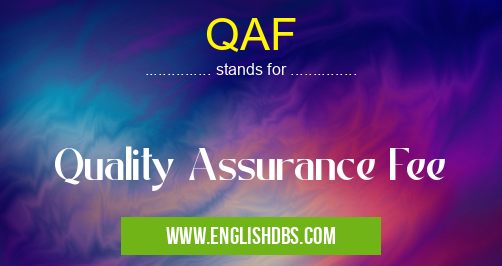What does QAF mean in QUALITY ASSURANCE & CONTROL
In various industries, the acronym QAF stands for Quality Assurance Fee. It refers to a charge levied by certain organizations to ensure the quality of their products or services. QAF helps cover the costs associated with quality control measures, such as inspections, testing, and certification.

QAF meaning in Quality Assurance & Control in Miscellaneous
QAF mostly used in an acronym Quality Assurance & Control in Category Miscellaneous that means Quality Assurance Fee
Shorthand: QAF,
Full Form: Quality Assurance Fee
For more information of "Quality Assurance Fee", see the section below.
Purpose of QAF
The primary purpose of a QAF is to:
- Maintain Quality Standards: Ensure that products or services meet predetermined quality specifications.
- Verify Compliance: Verify that products or services comply with relevant industry standards and regulations.
- Provide Assurance to Customers: Provide customers with confidence in the quality and reliability of the products or services they receive.
- Reduce Liability: Mitigate potential liability issues by ensuring that products or services are safe and meet expectations.
How QAF Works
Organizations typically determine the QAF based on factors such as the cost of quality control measures, the value of the product or service, and the perceived value to the customer. The fee may be a fixed amount, a percentage of the purchase price, or a combination of both.
Benefits of QAF
Implementing a QAF can provide the following benefits:
- Improved Product/Service Quality: Encourages organizations to prioritize quality throughout their production or service delivery processes.
- Enhanced Customer Satisfaction: Provides customers with greater peace of mind and builds stronger relationships.
- Reduced Defects and Errors: Reduces the likelihood of defective products or service failures, saving costs and reputation.
- Compliance and Certification: Supports compliance with industry regulations and standards, enhancing the organization's credibility.
Essential Questions and Answers on Quality Assurance Fee in "MISCELLANEOUS»QUALITY"
What is a Quality Assurance Fee (QAF)?
A Quality Assurance Fee (QAF) is a charge applied to products or services to cover the costs associated with ensuring that the products or services meet certain quality standards. QAFs are typically used to cover the costs of testing, inspection, and other quality control measures.
Why are Quality Assurance Fees charged?
QAFs are charged to ensure that products or services meet the expected quality standards. They help to cover the costs of testing, inspection, and other quality control measures, which are necessary to ensure that products or services are safe, reliable, and meet customer expectations.
Who typically pays Quality Assurance Fees?
QAFs are typically paid by the manufacturer or provider of the product or service. In some cases, QAFs may be passed on to the customer, but this is typically only done when the costs of quality assurance are significant or when the customer specifically requests that the product or service meet certain quality standards.
What are the benefits of paying Quality Assurance Fees?
Paying QAFs provides several benefits, including:
- Reduced risk of product or service failure
- Improved product or service quality
- Increased customer satisfaction
- Enhanced brand reputation
- Reduced potential for product liability
Final Words: QAF plays a crucial role in ensuring the quality of products and services, protecting customers, and maintaining the reputation of organizations. It serves as a financial mechanism to support quality control efforts and promote a culture of quality within businesses. By implementing and adhering to QAF standards, organizations can demonstrate their commitment to providing customers with reliable and safe products or services.
QAF also stands for: |
|
| All stands for QAF |
